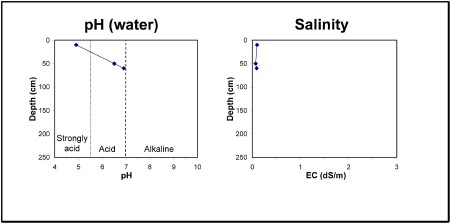MM385
| Site: MM385 | Land Unit: Skipton Basalt |
| Aust. Soil Class.: Ferric, Mottled-Subnatric, Grey SODOSOL (confidence level 3) | |
| General Land Unit Description: This land unit consists predominantly of gently undulating plains around Skipton. There are some steeper slopes leading to the major drainage lines as well as those coming off Naminia Hill. The soils are variable, reflecting the complex landform in this land unit. Ferric Brown and Grey Sodosols occur chiefly on the lower slopes, and Bleach-Ferric Brown Chromosols occur on the plains and slopes. Areas of gilgai microrelief are usually found in this unit and the soils associated with these areas are commonly Black Chromosols with minor occurrences of Brown Chromosols. The soils on the mounds and in the depressions are similar apart from those on the mounds having shallower surfaces. A few scattered surface stones may occur on the upper slopes and crests of some rises. |
Site Description:
| Geology: Quaternary basalt | Landform pattern: Gently undulating plain |
| Position in landscape: Lower slope | Internal drainage: Imperfectly drained |
Soil Profile Morphology
| A1 | 0-20 cm | Dark greyish brown (10YR4/2), clay loam, hard-setting surface, ferromanganiferous nodules are common, pH 4.9, clear transition to: |
| A2 | 20-40 cm | Very pale brown (10YR7/3) clay loam, conspicuously bleached (10YR8/1) when dry, ferromanganiferous nodules are abundant, sharp transition to: |
| Subsoil | ||
| B21 | 40-60 cm | Yellowish brown (2.5Y6/2) medium clay, red mottles, moderate blocky structure (10-20 mm), pH 6.5, gradational transition to: |
| B22 | 60+ cm | Light brownish grey (2.5Y6/2) medium clay, yellowish brown mottles, moderate blocky structure (10-20 mm), ferromanganiferous nodules are common, pH 6.9. |
Key profile features:
- Strongly acidic topsoil
- Bleached A2 horizon
- Mottled subsoil
- Ferromanganiferious nodules are abundant in A2 horizon
- Topsoil dispersive when worked when wet
- Subsoil dispersive when dry
- Sodic subsoil



